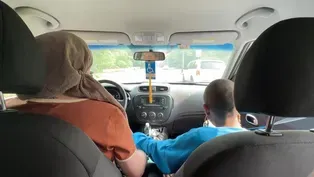
What to know about protests against the far-right in Germany
Clip: 2/10/2024 | 5m 10sVideo has Closed Captions
What to know about Germany’s far-right politics and protests against its rise
For weeks, Germans have been flooding into streets, squares and parks, protesting the increasing influence of far-right parties. This comes as the leading far-right party in Germany suffered a narrow defeat in regional elections that were held in one of the party’s strongholds. POLITICO editor James Angelos joins Ali Rogin to discuss the impact of this increasingly tense political atmosphere.
Problems with Closed Captions? Closed Captioning Feedback
Problems with Closed Captions? Closed Captioning Feedback
Major corporate funding for the PBS News Hour is provided by BDO, BNSF, Consumer Cellular, American Cruise Lines, and Raymond James. Funding for the PBS NewsHour Weekend is provided by...

What to know about protests against the far-right in Germany
Clip: 2/10/2024 | 5m 10sVideo has Closed Captions
For weeks, Germans have been flooding into streets, squares and parks, protesting the increasing influence of far-right parties. This comes as the leading far-right party in Germany suffered a narrow defeat in regional elections that were held in one of the party’s strongholds. POLITICO editor James Angelos joins Ali Rogin to discuss the impact of this increasingly tense political atmosphere.
Problems with Closed Captions? Closed Captioning Feedback
How to Watch PBS News Hour
PBS News Hour is available to stream on pbs.org and the free PBS App, available on iPhone, Apple TV, Android TV, Android smartphones, Amazon Fire TV, Amazon Fire Tablet, Roku, Samsung Smart TV, and Vizio.
Providing Support for PBS.org
Learn Moreabout PBS online sponsorshipJOHN YANG: For weeks, Germans have been flooding into streets, squares and parks protesting the increasing influence of far right parties.
It comes as Germany's leading far right party suffered a narrow defeat in regional elections in one of its strongholds.
Ali Rogin explores the impact of this increasingly tense political atmosphere.
ALI ROGIN: The catalyst for the protests came from a recent report by the media outlet Correctiv.
It details a meeting between leaders of the far right AfD, or the Alternative for Germany Party, and members of a separate extremist movement.
In that meeting, they discussed a plan for re migration involving mass deportations of immigrants, including some with German citizenship.
The AfD has since distanced itself from the meeting, but that hasn't slowed the demonstrations.
Some protesters are calling for an outright ban of the AfD, which is seen as too aligned with Germany's Nazi past.
James Angelos is an editor for POLITICO, based in Berlin.
Thank you so much for being here.
Tell us about who the members of the AfD party are and how much influence do they have in Germany right now?
JAMES ANGELOS, Editor, POLITICO: The party has been rising in polls leading up to this report.
It is second right now, polling second behind the opposition conservatives.
So right now, the party is more popular than any of the parties that are currently in the German government.
There are three parties making up the ruling coalition, and the AfD is more popular than all three of them.
ALI ROGIN: And so what is happening politically in Germany right now that is making them more popular?
JAMES ANGELOS: There has been a rise again recently of asylum seekers entering Germany from countries like Syria and Afghanistan.
And they are anti-migration party.
That's their sort of core issue.
There are other issues that they're taking advantage of at the moment.
Energy prices skyrocketed following Russia's invasion of Ukraine, inflation and the economy right now is not doing well.
So there is a general unease in the population that's also helping the party.
And they are particularly strong in the former East Germany, where there is also more sympathy, perhaps for taking on a friendlier stance toward Russia.
ALI ROGIN: And of course, the flip side of rising popularity is, as we've been seeing, rising opposition and more people speaking out against them.
So why are these protests happening now?
JAMES ANGELOS: Well, the catalyst really was this report, and combined with the fact that the party has been rising in polls even as it has grown more extreme, I think this struck a nerve for multiple reasons, this gathering.
People saw echoes of the Nazi past, and you know, some politicians even called it a Nazi party.
These protests are ongoing.
They're large.
There's no sign that they're winding down.
And the people who are organizing them see themselves really as standing up for the survival of the republic against a very acute and immediate threat.
ALI ROGIN: Are these protests articulating any specific demands, or is it more about showing up and speaking up against the AfD?
JAMES ANGELOS: I think it's more about showing up and speaking out and showing the country that there is this sort of mass resistance against the party.
There has been a small drop in support for the party, so it does seem to be having some kind of impact.
But the question then is whether the core support for this party arose as a result of this.
Many people believe it won't affect that core group of supporters.
ALI ROGIN: And it also seems that this is all happening all around Europe right now.
Of course, in neighboring Austria, there have also been protests against far right parties.
Sort of that same dynamic of a rise in a party is bringing out more resistance.
Certainly there are far right parties entrenched in other parts of the European continent, in Italy and Hungary.
So should we be viewing all of this as a whole, or should we be paying more attention to the individual context of what is happening in each of these separate countries?
JAMES ANGELOS: The things that are happening in Germany are not exclusive to Germany.
There are similar trends across Europe and in the United States.
I think what makes Germany special case is this cognizance of the Nazi past.
And within the German constitution, there are all these safeguards to prevent far right or extreme parties from using democracy, using the ballot box to gain power, and then undermining the.
So, you know, there's a big debate going on in Germany right now about whether the best way forward would be to try to ban this party, and that's actually legally possible to do in Germany's post war constitution.
The question then is whether that's tactically a smart thing to do, because the AfD, of course, comes back and says, well, you're going to try to ban us.
That itself is anti-democratic and you're disenfranchising our supporters.
The legal hurdles for trying to ban the party are very high, and people are afraid if the effort fails, then it will just strengthen the party.
ALI ROGIN: James Angelos with POLITICO, thank you so much for joining us.
JAMES ANGELOS: Thank you.
The role of social media companies in the 2024 election
Video has Closed Captions
Can social media companies safeguard the 2024 election against misinformation? (6m 18s)
The unique challenges of dating with disabilities
Video has Closed Captions
The unique challenges of dating and finding love while living with disabilities (8m 10s)
Providing Support for PBS.org
Learn Moreabout PBS online sponsorshipSupport for PBS provided by:
Major corporate funding for the PBS News Hour is provided by BDO, BNSF, Consumer Cellular, American Cruise Lines, and Raymond James. Funding for the PBS NewsHour Weekend is provided by...













